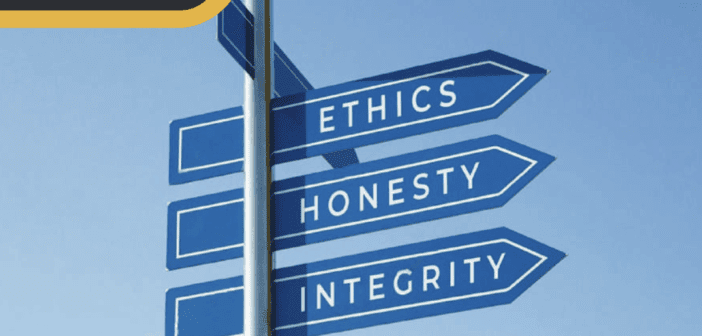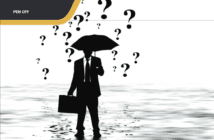By Jim McFie, a Fellow of ICPAK
What Happens When Integrity Is Absent?
The “Handbook of the International Code of Ethics for Professional Accountants,
Including International Independence Standards” is published each year by the International Federation of Accountants.
The 2023 edition was issued in September 2023. There are a number of recently approved revisions to the Code. One is the definition of the engagement team in an audit and of the group audit. In ISQM 1 the audit team is defined as “All partners and staff performing the engagement, and any other individuals who perform procedures on the engagement, excluding an external expert and internal auditors who provide direct assistance on an engagement”. For the definition of a group audit, I would request you to refer to either ISQM 1 or the most recently issued Code. The revisions in the Code deal with the independence and other implications of the changes made to the definition of “the engagement team” in the Code to align with changes to the definition of the same term in the IAASB’s International Standards on Auditing (ISAs) and International Standards on Quality Management (ISQMs). The revisions also address holistically the various independence considerations in an audit of group financial statements.
The revised provisions relating to the definition of the engagement team and the group audit will be effective for audits of financial statements and audits of group financial statements for periods beginning on or after December 15, 2023. Early adoption of the revisions is encouraged.
Another revision is the upcoming expiry of the “jurisdictional provision” addressing a long association of personnel with an audit client. The jurisdictional provision will expire and no longer be available for audits of financial statements for periods beginning on or after December 15, 2023. Under the jurisdictional provision (paragraph R540.20 of the Code), where a legislative or regulatory body (or organization authorized or recognized by such legislative or regulatory body, e.g. ICPAK) has established a cooling-off period for an engagement partner of less than five consecutive years, that shorter cooling-off period may be applied, subject to a floor of three years, provided that the applicable time-on period does not exceed seven years.
At the end of the 2023 Handbook are those IESBA-approved revisions to the Code which are not yet effective. These revisions will become effective in December 2024; one is a revision of the definition of a public interest entity (PIE); another is a change of the definition of “the audit client” and the definition of “the group audit client”; in addition there are revisions which are technology-related.
Many members of ICPAK may think that the Code does not apply to them because it covers numerous matters dealing with audit and assurance engagements.
But it is important to remember that the Code requires all professional accountants to comply with the fundamental principles of ethics. They must apply the conceptual framework to identify, evaluate and address threats to compliance with the fundamental principles. Applying the conceptual framework requires exercising professional judgment, remaining alert for new information and to changes in facts and circumstances, and using the reasonable and informed third party test.
Let us do a little revision of the basics: the five fundamental principles are “integrity, objectivity, professional competence and due care, confidentiality, and professional behavior”.
Integrity is to be straightforward and honest in all professional and business relationships. I think we need to go further than this. We need to change Kenya into a nation of honest people: we are very far from this at the moment and the situation deteriorates daily.
It is now routine for schools to cheat in examinations. Children are taught to cheat at a young age. Some Principals, Teachers, invigilators and the police aid and abet the cheating. Some officials of the Kenya National Examinations Council are deeply involved. It was alleged that a number of papers in the current Kenya Certificate of Secondary Education examinations were available on WhatsApp groups before the actual exam. Owning a piece of land is vital for many people. The lands department seems to be in chaos. For Government services, citizens may have to bribe to obtain some of the services provided “free” or even at a cost – the bribe is over and above “the cost”. In certain cases, approvals to start and do business come at a heavy cost. Some politicians are busy destroying the country with the changes they advocate to eliminate “cartels” by creating new “cartels”.
Forty years ago Kenya was the largest producer of pyrethrum in the world: Kenya produced and exported more pyrethrum than all the other countries in the world. Government officials took over the Pyrethrum Board: the farmers had to feed their families; to do so they switched from pyrethrum to maize. Kenya now exports a negligible amount of pyrethrum: check out the number from the 2023 Economic Survey produced by the National Bureau of Statistics: Tanzania is now the world’s largest producer of pyrethrum.
” Kenya gets much of the foreign currency it earns from the export of its tea. The Mombasa Tea Auction is the world’s largest black “crush, tear and curl” (CTC) tea auction for export. Each week teas worth over US$20 million were traded from eleven countries: Kenya, Uganda, Tanzania, Rwanda, Burundi, the Democratic Republic of the Congo, Malawi, Madagascar, Mozambique and Ethiopia. On Tuesday 14th November 2023, Tanzania held its first ever tea auction in Dar es Salaam, a move that is expected to increase earnings for Tanzania’s tea subsector while posing a direct challenge to the Mombasa Tea Auction which until now was the only tea auction in East Africa.
The new electric Tanzania Standard Gauge Railway will link the port of Dar es Salaam to Rwanda, Uganda and Burundi, and through these countries to the Democratic Republic of the Congo. Part of this railway is known as the Isaka–Kigali SGR which will link the town of Isaka in Tanzania to the city of Kigali in Rwanda. When that happens, Tea from Rwanda, Burundi, the DRC, Malawi, Madagascar and Mozambique will be auctioned in Dar. The coffee sector in Kenya is being disrupted. James Muriithi Kieu attended the world’s largest coffee gathering in Boston at the beginning of 2023. He was told that Kenya is no longer considered a coffee producing country since it now produces only 0.2% of the coffee grown in the world -40,000 tonnes. Uganda produced 288,000 tonnes of coffee in 2022, making it the world’s eighth largest producer. In Kenya, all coffee licences were withdrawn earlier this year. Brazil early this year came back strongly to the market after suffering from covid, drought and floods. The world price of coffee has fallen from 0ver $7 per kilo a year ago to the current $3.88. Brazil makes a profit selling at this price. Kenya’s coffee farmers, over half a million of them, have coffee but cannot sell it because all the millers except KPCU have lost their licences. Kenya needs foreign exchange: the coffee will produce some. Instead Kes 4 billion has been used to pay the farmers.
Chavez, the President of Venezuela before the current one, Maduro, nationalized the oil industry in the country. Venezuela has the largest oil reserves in the world: 300 billion barrels. Saudi Arabia is close behind at 297 billion barrels. Saudi Arabia is the third largest daily producer of oil – it produces 10.2 million barrels per day: Venezuela produces 788 thousand barrels per day. Government officials all over the world are notoriously bad at running anything. Chavez turned the richest country in South America into the poorest.
Kenya has recently confirmed a deal to buy the petrol, diesel and paraffin that the country uses:”. Uganda saw the problem of having to pay a higher price for these commodities and made a contract with a different supplier. “Kenya’s” response was “Uganda” cannot transport its “oil” through the pipeline. 90% of Uganda’s oil imports currently go through Kenya: Kenyans earn money from this transport business: at present 10% of Uganda’s oil goes through Tanzania. FCPA Billow Kerrow from Mandera used to transport oil in 2009 to Burundi and Rwanda. In 2018 those countries decided to import their oil through Tanzania. As Patrick Obath, the Chair of the Board of the National Oil Corporation of Kenya, pointed out, if Uganda stops using the pipeline in Kenya, KPC’s (The Kenya Pipeline Company’s) income will decrease by at least 40%. Instead of importing its oil through Kenya, Uganda will eventually import it through Tanzania – Kenya, and your children, will be the loser.
Just as dishonesty can destroy a country, so it can destroy a company: we can easily cite Enron and Lehman Brothers in the US, Carillion and Wilko in the UK, Scotch and Soda in the Netherlands and Wirecard in Germany as examples. But we have Uchumi, Mumias Sugar, Imperial and Chase Banks here in Kenya. It has been reported that NHIF has lost Kes 10 billion due to false medical claims. Between Kes 791 million and Kes 1.8 billion was stolen from NYS. A certain lady, writing an article entitled “We shall all be wiped off the face of the Earth” on page twenty of the Saturday Nation of 18 November 2023 states “I do my best to be a good person. I try to do the right things and not to do the wrong things”. A little more than halfway through the article she admits “Sometimes, I steal things from the supermarket. Little things of little consequence like gel pens and school pencils, a fancy rubber, chocolates . . . nothing that hurts anyone, like stealing packets of flour or sugar, maybe sausages” and she continues to explain why.
James Lehman in Empowering Parents.com writes “Many parents have asked me over the years, ‘Is shoplifting a candy bar or cosmetics or clothes the same as stealing?’ The truth is, stealing is stealing. It is criminal, antisocial and worst of all, it corrodes a child’s development, character and integrity through the use of justifications and excuses”.
It is easy to deal with the theory of integrity. But what happens when integrity is absent? What are the consequences when individuals, whether in their personal lives, professional environments, or public personas, exhibit a lack of integrity? Lance Armstrong, the former professional cyclist was stripped of his seven Tour de France titles and banned from professional cycling for life for doping offenses. Armstrong denied the allegations for years, even going so far as suing those who accused him, only to admit to the charges in a televised interview in 2013.
His lack of integrity not only affected his career but also tarnished his reputation, the reputation of the sport and led to significant legal troubles. In Kenya, he would probably not have had to face legal problems. When there is a lack of integrity in society as a whole, the effects are far-reaching. Trust in institutions and leaders is lost Social norms are undermined. People can no longer trust one another. Care for the less fortunate is thrown out. Honest people can even lose their lives. Caracas, the capital on Venezuela became one of the most crime ridden cities in the world. Where is Kenya and Nairobi in particular, headed to?
Let us lead by example and demand that those around us live with integrity too.




